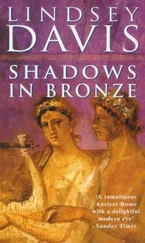Lindsey Davis - Master and God
Здесь есть возможность читать онлайн «Lindsey Davis - Master and God» весь текст электронной книги совершенно бесплатно (целиком полную версию без сокращений). В некоторых случаях можно слушать аудио, скачать через торрент в формате fb2 и присутствует краткое содержание. Жанр: Исторические приключения, на английском языке. Описание произведения, (предисловие) а так же отзывы посетителей доступны на портале библиотеки ЛибКат.
- Название:Master and God
- Автор:
- Жанр:
- Год:неизвестен
- ISBN:нет данных
- Рейтинг книги:3 / 5. Голосов: 1
-
Избранное:Добавить в избранное
- Отзывы:
-
Ваша оценка:
- 60
- 1
- 2
- 3
- 4
- 5
Master and God: краткое содержание, описание и аннотация
Предлагаем к чтению аннотацию, описание, краткое содержание или предисловие (зависит от того, что написал сам автор книги «Master and God»). Если вы не нашли необходимую информацию о книге — напишите в комментариях, мы постараемся отыскать её.
Master and God — читать онлайн бесплатно полную книгу (весь текст) целиком
Ниже представлен текст книги, разбитый по страницам. Система сохранения места последней прочитанной страницы, позволяет с удобством читать онлайн бесплатно книгу «Master and God», без необходимости каждый раз заново искать на чём Вы остановились. Поставьте закладку, и сможете в любой момент перейти на страницу, на которой закончили чтение.
Интервал:
Закладка:
‘Done his business?’
‘Eventually. You take him next time!’ Lucilla grumbled. ‘It’s so dark! I was petrified — you know Horace once saw a wolf here when he was strolling about singing. It ran away from him, luckily.’
‘Any wolf that turns tail from a poet is a crap wolf.’
‘And a tree fell on Horace once and nearly brained him.’
Gaius, now softened by the quiet country night, enveloped her and kissed her. ‘You might be brained by a windowbox in a city street just as easily… I could live in a place like this.’
‘On a farm?’
‘I own a farm,’ Gaius reminded her. He made it sound significant. ‘In Spain.’
The dog had covered his snout and legs with leaf litter and had rolled in a pungent substance that had been deposited by a wild animal with a foul diet. They had to take him to the baths to be washed before he could go back in the house. There was no one about, but the single slave on duty volunteered to clean up Baby, keeping him well outside the pristine suite of hot rooms. Gaius and Lucilla had arrived too soon before dinner for more than basic ablutions, so as there was still hot water they went in and enjoyed the rare thrill of bathing together.
Gaius thwacked into the plunge pool, emerging to find Lucilla laughing as she watched him. After shaking off showers of water drops, he floated on his back naked and cheerful — the Gaius that Lucilla loved to see.
‘Oh I could get used to this! In Tarraconensis, I am told, my old centurion’s estate includes a farmhouse, like the simple place Horace had here originally. My manager says it’s become a hovel, so I could transfer money out there and rebuild. Mosaics and my own bath house to chase you round — there’s a thought.’
‘ That much money? And Tarraconensis?’ repeated Lucilla in pretend tones of horror.
Parthenius’ slaves had kindly left snacks and wine in their bedroom. The bed was soft with feather mattresses and pillows, in the lush, almost effeminate taste most wealthy palace freedmen had. Giggling, they made the most of it. At least they tried to, until Baby began howling.
Later, when they were back in Rome, Lucilla realised that must have been the night she became pregnant.
In fairness, Gaius did like the Parthenius plotting agenda:
Why?
Where, when, how, who?
What unlucky bugger do we choose to go next?
For obvious reasons this was never written down.
Gaius approved of the fact that Why was never taken for granted, but was formally considered. ‘Our once caring and conscientious ruler has become a cruel tyrant. There is no chance he might leave voluntarily. We must remove him.’
Agreed.
Where: they decided it must be done in Rome. Alba was remote but Domitian was equally protected there. In view of the rumours that started when Nero died outside the city, even only four miles away, Rome would make the event appear more open.
Those gathered at Horace’s villa never introduced themselves, though some were recognisable, including Entellus, the petitions secretary, another bureaucratic mogul. He sought advice from the cornicularius. Lucilla was surprised Gaius cooperated, though she then realised his contribution was so factual anyone could safely say such things openly: they should avoid the horror of a death in public. So not at the Games. The palace offered a secure, containable location, ‘where any balls-ups can remain hidden.’ His soldierly belief that hitches were inevitable made the others look nervous.
A long argument ensued, with people faffing about whether to tackle their victim at dinner or the baths. At dinner, it was thought he might be relaxed and off-guard — although Domitian’s main meal was generally lunch. In the baths, anyone was vulnerable. Clodianus pointed out dryly that an armed, clothed assassin would stand out among the oiled nudes, plus there was a risk the would-be killer would slip on a wet floor and go arse-over-tip. He spoke gravely, yet appeared insidiously satirical.
Too difficult: the dinner or baths debate was dropped. Parthenius ordered up a buffet lunch. They ate in the garden, to the sounds of cicadas and tumbling water. Baby was having the time of his life in the elegant pool; the young boy Burrus was boisterously playing with him.
When depended on Domitian being in the capital. Parthenius would keep a close watch on his diary for a suitable moment; first he wanted to wait until there was a favourable consul, to keep a grip on senators. Then the Senate could be summoned quickly, too, and the next emperor proclaimed fast. Whoever that was. They discussed other important people in Rome. With the Praetorian Prefects sympathetic (or Secundus sympathetic and Norbanus somehow dealt with), the Prefects of the City and Vigiles would probably acquiesce, locking down Rome until everything had settled. If Rome stayed calm, there would be more chance of avoiding mutiny abroad.
They had to consider Domitia Longina. While afternoon refreshments were brought — for this was a very comfortable kind of conspiracy — Parthenius asked if Lucilla could transfer her services to the Empress, now Domitilla was gone.
‘To observe?’ asked Gaius, with a narrow look. ‘Working for the plot?’
‘An idealist would say, she is working for Rome,’ corrected Parthenius.
Lucilla smiled. Gaius did not buy that crap. Neither did she. ‘Is Domitia Longina aware of us? If not, is she to be told?’
‘What would you advise, Lucilla?’
‘Say nothing. Never force her to choose sides.’
‘My feeling is,’ Parthenius said, ‘she is now trapped with him, in fear for her life.’
‘Don’t underestimate her loyalty,’ Lucilla warned. ‘She married him for love, and in their way it has been a successful partnership. Despite his mad behaviour, she has shown she means to stick it out.’
‘But she must feel certain he no longer loves her.’
‘So? I don’t suppose she still loves him. How could she? Women stay married for plenty of reasons. She has always been conscious of her position as Corbulo’s daughter; she is equally proud to be the Augusta, with her crowns and carriages. Those two still have the habits of enduring one another that come from any lengthy marriage. So, for safety, keep her out of it.’
How? Poison was problematical, and a woman’s method. Nero’s attempts to murder his mother had shown that trick beds, drowning accidents or the like were foolish and dented public confidence. Strangling was a punishment for criminals; in Rome, it was important to respect rank. This was an emperor; they were terminating his career for decent reasons. Ever since Julius Caesar, despots had been killed with blades. That was the mark of noble killers, killers with consciences.
Who became a poser. People tried to pressurise Clodianus, the only soldier present; he refused the honour, citing what his Prefect Secundus had said: that the Guards should only refrain from intervention. Parthenius said he had some ideas, but deferred a decision.
What unlucky bugger do we choose next? Everyone pitched in to discuss a replacement emperor.
Entellus, the petitions secretary, went through a list, apparently without notes. Emperor was hardly a job anyone could apply for, in the way of requesting a sideways move to Supplies or an upgrade to Transportation. On the other hand, if the position ceased to be hereditary, this was no different from putting together any promotion board.
‘Ought we to consider the two Flavian boys?’
‘No!’
‘No boy emperors.’
‘No relations of Domitian either.’
Their team had to headhunt a man of standing and calibre, but critically, someone who would agree to do it. Based on Entellus’ suggestions, names of men to approach were shared out among people who knew them. Previous attempts to interest a candidate had miserably come to nothing. Those asked had changed their minds, were waiting for their wives’ reactions, had already been told to say no by the wife, were too cautious, or ill, or had an ill grandfather they were suddenly very fond of, or were aware of the situation and thought these were novel proposals but unfortunately could not make full disclosure of their intentions at this stage…
Читать дальшеИнтервал:
Закладка:
Похожие книги на «Master and God»
Представляем Вашему вниманию похожие книги на «Master and God» списком для выбора. Мы отобрали схожую по названию и смыслу литературу в надежде предоставить читателям больше вариантов отыскать новые, интересные, ещё непрочитанные произведения.
Обсуждение, отзывы о книге «Master and God» и просто собственные мнения читателей. Оставьте ваши комментарии, напишите, что Вы думаете о произведении, его смысле или главных героях. Укажите что конкретно понравилось, а что нет, и почему Вы так считаете.












